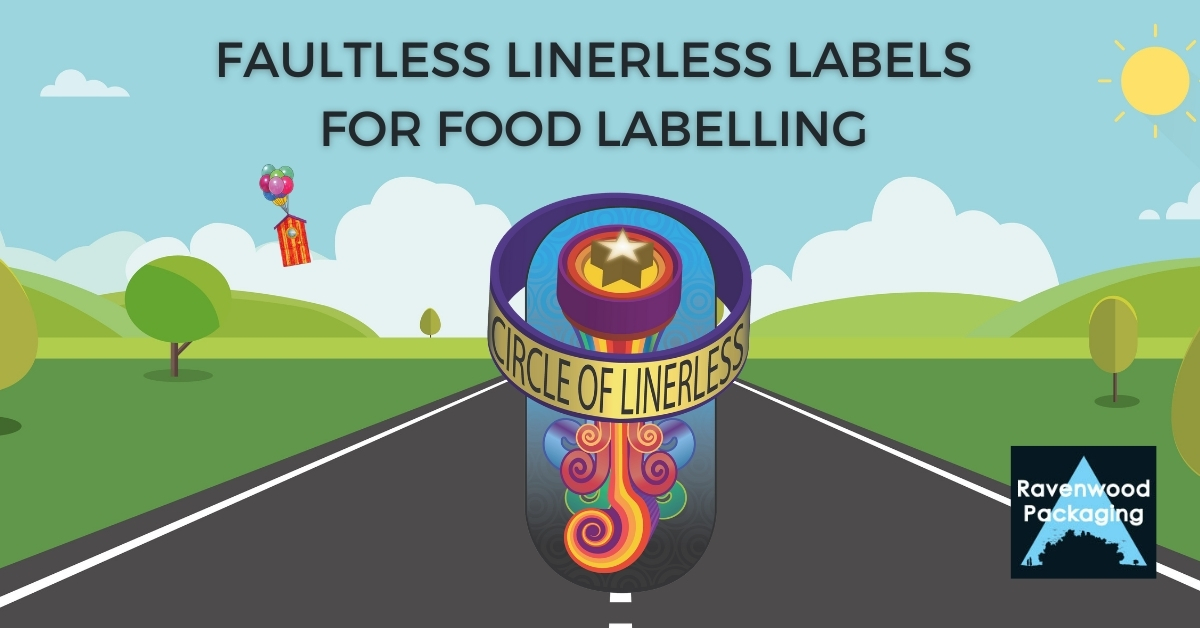
Ravenwood considers this a ‘bond of trust’, developed and refined over many years. From label design concepts, all the way through to the product landing on supermarket shelves.
Let’s fully explain the food labelling process
Supplied across a world-wide network of machinery distributors and label converters, the tried and tested formula safeguards food manufacturers and brand owners. With strict standards and guidelines in force, means that their food labelling won’t let them down at any stage during the production and application process.
Label Stock and Adhesives
For the best label substrates, adhesives and silicones, Ravenwood has sourced and developed a vast selection from the industry’s leading raw material suppliers. Label materials include a range of paper weights up to 300gsm. Label stock available includes water resistant, food grade and pp film to suit many different types of foods and storage environments. A food grade adhesive has also recently been developed and is now available for direct contact with food.
Com500 Coater
In order to produce the labels, a label converter would need to purchase a Com500. Standing at 4 metres wide and 2 metres deep, the coater is the only system dedicated to producing Ravenwood linerless labels. So let’s summarise linerless. A silicone strip is applied to the top of the label reel and an adhesive strip is also then applied in the same position, on the underside. This allows for the reel of labels to be wound on a roll without the need for toxic label liner. Subsequently, the reel of labels ‘sticks’ to itself. Backing paper is bad for the planet, as it needs to be landfilled. Opting for linerless means zero liner to landfill and reduced CO2 emissions.
Nobac 5000 Linerless Applicators
For the food labelling application, a machinery distributor would need to purchase a Nobac 5000 linerless applicator. The sleevers are designed for maximum flexibility, in applying a diverse range of linerless labels. Over the years, many new machine variants have been adapted, due to customer demand for offering increased flexibility. The Nobac machine range is extremely robust, suiting even the most rigorous of factory environments. Speeds of up to 150 packs per minute can be achieved. The latest to be launched is the new 5000L, Fruit Lid machine.
VXR Vision Pack Inspection System
Last in line, but certainly not least, is the VXR Vision Pack Inspection System. Ravenwood consider this the ‘end of line solution provider’. The VXR can be linked to a Nobac 5000. When combining its three technologies, the key functionality of the VXR system is to identify and reject food trays that are seen to contain errors. As well as checking for faulty labels, printing errors, barcodes and use-by dates. And with x-rays, the system can detect a broad range of dense mass and contaminates. Furthermore, ‘seal check’ ensures that the seal is secure on all food trays. It can also ‘count’ the number of products in a tray, such as meatballs. The VXR will safeguard your brand and avoid costly food recalls.
Ravenwood’s Global Network of Machinery Distributors and Printer Partners
Ravenwood’s network of 38 machinery distributors and 21 printer partners are automatically signed up as members of the ‘Circle of Linerless’. They are briefed fully as to the entire process and realise that cutting corners and using cheaper, sub standard alternatives is not an option. Brand owners want quality and consistency where their food labelling is concerned, in addition to the overall sustainability benefits.
Driving Down CO2
All Ravenwood machinery is built in the UK. This means that carbon emissions are kept to a minimum and this is especially apparent where the Nobac 5000 linerless applicator is concerned. Over 90% of the machine’s weight is produced in the UK and all parts are machined on site at Ravenwood’s factory in Norwich or sourced within a 4-mile radius.
More and more brand owners are now switching to linerless in a bid for carbon neutrality. As mentioned, the main USP of linerless is that there is no release liner. By eliminating the liner carries many benefits, including zero waste to landfill, disposal costs and a much-reduced carbon footprint. Linerless is a more environmentally friendly and sustainable process of food labelling. In 2020, Ravenwood prevented 12.1 million KG of CO2 being released into the atmosphere. In the same year, Ravenwood produced 5 billion labels worldwide, thus saving 82 million m2 of label liner going to landfill or incineration.
Circle of Linerless – Fast Facts
- Faultless linerless labels
- Performance guarantee
- Fully approved sustainable materials
- 24/7 support
- Disaster recovery
- Preloved Programme
- Dedicated distributor and printer network







